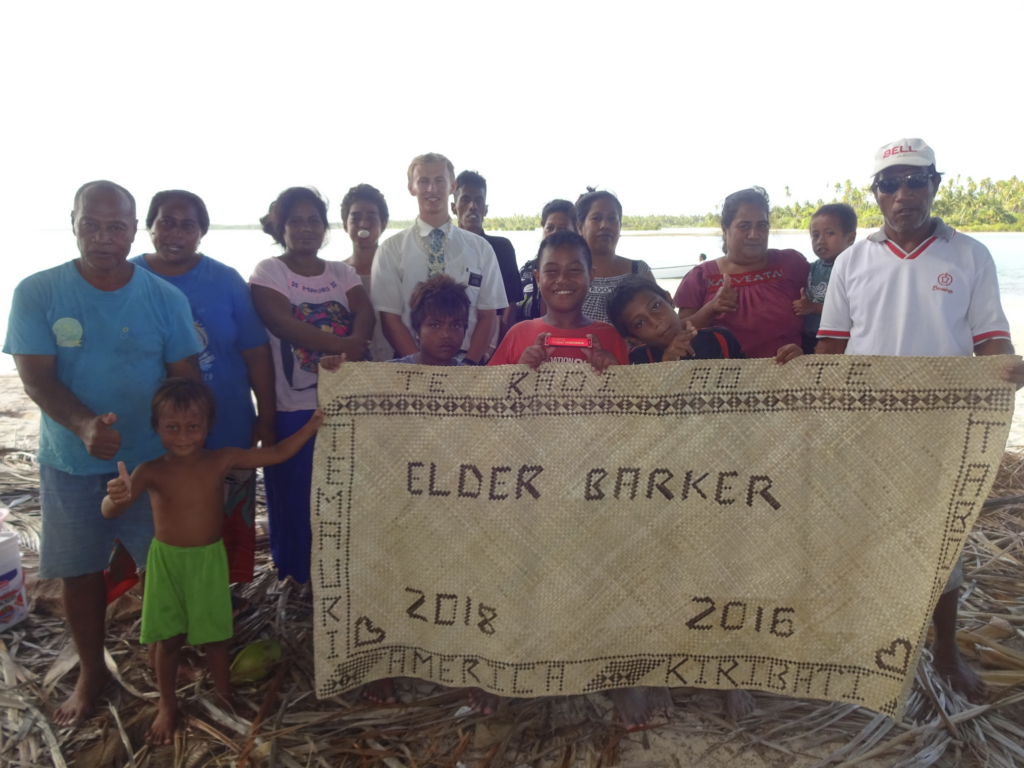
When Kaleb Barker first set foot in Kiribati, a small island nation in the Pacific, he had no idea how much that experience would shape his perspective on healthcare disparities. His mission to serve others became an eye-opening journey. From eating sea turtles and whales in Kiribati to digging a well for fresh water in a community without electricity, this unique experience ignited his passion for medicine.
A Simple Job with a Profound Impact
One of Barker’s most cherished memories from his time in Kiribati is the experience of helping a woman dig a well on a small, remote island.
“She had just moved there and didn’t have any family nearby,” Barker recalls. “She needed access to fresh water, and it became our mission to help her.”
The task was daunting, as the water was deep underground, but Kaleb and his team worked tirelessly, spending hours each day digging.
“It took a long time to get to the water,” he says, “but through the process, we got to know her really well.”
What seemed like a simple task became something much more meaningful. “It might seem like a small thing, helping someone get water, but that meant the world to her, and it was so rewarding for us.”
Unexpected Hospitality
Barker remembers another powerful experience during his time in Kiribati when he was assigned to an island where missionaries like him had never lived before.
“We took a small boat to the island, arrived with our suitcases, and didn’t know anyone or even have a place to stay. We barely spoke the language,” Barker recalls.
Feeling uncertain about what the night would bring, they spent the evening playing volleyball with the locals. After the game, the locals asked where Barker and the other missionaries planned to sleep.
“When we told them we would probably sleep on the beach, they immediately invited us into their homes,” Barker said, deeply moved by their selflessness. “Their kindness amazed me,” he adds.
Years later, Barker returned to that same island and was touched to find that this same family was still hosting missionaries. “Their small act of kindness left a lasting impact on not just us but everyone else who came afterward,” he reflects.
Understanding Healthcare Challenges
Barker’s time in Kiribati also came with health challenges, where he experienced firsthand the harsh realities of healthcare in underserved areas.
“I had pneumonia and other health issues that required hospital visits. The main island had a central hospital, but the outer islands depended on smaller clinics staffed by skilled nurses. However, these clinics often lacked essential medical supplies and resources.”
He describes the experience as physically demanding, adding, “The environment was tough, access to care was limited, and I saw firsthand how hard it was for the locals to get the healthcare they needed, especially in the more remote areas.”
These experiences planted the seeds for Barker’s future in engineering medicine. “At the time, I didn’t specifically think about engineering medicine,” he says. “But I noticed areas for improvement, like exam tables rusting in the tropical climate. Those experiences revealed opportunities for meaningful improvements in underserved healthcare systems.”
Giving Back to Kiribati
Even after his time in Kiribati, Barker remains deeply committed to the island and its people. His ongoing connection to the community has fueled his efforts to give back in a meaningful way. Together with a dedicated team, he is actively raising funds to send crucial medical supplies to the main hospital in Kiribati, ensuring that healthcare in the region continues to improve.
“We’re partnering with Project C.U.R.E., an organization that specializes in delivering tailored medical supplies to underserved regions,” Barker shares. “The focus is on making sure the supplies get to the places that need them the most, whether it’s basic medical equipment or more specialized items. So far, we’ve raised about $45,000, and knowing that the supplies will directly benefit the people of Kiribati is incredibly rewarding.”
This initiative is close to Barker’s heart because he remembers firsthand the challenges the island faced during his time there, especially the lack of essential resources and equipment.
Now, with the support of his team and organizations like Project C.U.R.E., he can help fill some of those gaps, ensuring that local healthcare providers are better equipped to care for their communities.
For Kaleb Barker, this work isn’t just about giving back; it’s about continuing the journey that began during his time in Kiribati and making a lasting difference in a place that will always hold a special place in his heart.
